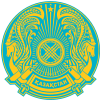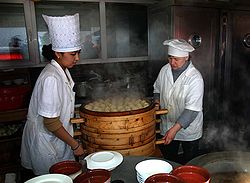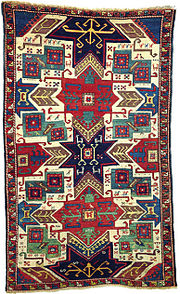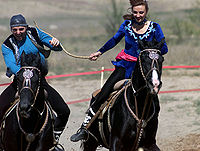- Culture of Kazakhstan
-
Before the Russian conquest, the Kazaks had a well-articulated culture based on their nomadic pastoral economy. Islam was introduced to Kazakhstan in the 7th to 12th century. Besides lamb, many other traditional foods retain symbolic value in Kazak culture. Kazakh culture is largely influenced by a Turkic nomadic lifestyle.
Because animal husbandry was central to the Kazaks' traditional lifestyle, most of their nomadic practices and customs relate in some way to livestock. Traditional curses and blessings invoked disease or fecundity among animals, and good manners required that a person ask first about the health of a man's livestock when greeting him and only afterward inquire about the human aspects of his life.
The traditional Kazak dwelling is the yurt, a tent consisting of a flexible framework of willow wood covered with varying thicknesses of felt. The open top permits smoke from the central hearth to escape; temperature and draft can be controlled by a flap that increases or decreases the size of the opening. A properly constructed yurt can be cooled in summer and warmed in winter, and it can be disassembled or set up in less than an hour. The interior of the yurt has ritual significance; the right side generally is reserved for men and the left for women. Yurts are also frequently used as a decorative motif in restaurants and other public buildings.
Contents
Modern Influences
Today's Kazakhstan is a modern culture, thriving in the post-Soviet era. The traditional Kazakh lifestyle has blended with influences from Western societies as well as those from Kazakhstan's Russian and Chinese neighbors.
Religion
Islam is the largest religion in Kazakhstan, followed by Russian Orthodox Christianity. By tradition the Kazaks are Sunni Muslims, and the Russians are Russian Orthodox. Approximately 47% of the population is Muslim.[1] The majority are Sunni of the Hanafi school, including ethnic Kazakhs, who constitute about 60% the population, as well as by ethnic Uzbeks, Uighurs, and Tatars.[2] Less than 25% of the population of Kazakhstan is Russian Orthodox, including ethnic Russians, Ukrainians and Belarusians.[1] Other religious groups include Judaism, the Bahá'í Faith, Hare Krishnas, Buddhists, and The Church of Jesus Christ of Latter-day Saints.[2]
Sports
Main article: Sports in KazakhstanRiders in traditional dress demonstrate Kazakhstan's equestrian culture by playing a kissing game, Kyz Kuu ("Chase the Girl"), one of a number of traditional games played on horseback .[3]
Cultivated a strong interest in sports, physical education and extracurricular activities. Kazakhstan has achieved some success in international competitions in weightlifting, ice hockey, and boxing. Kazakhstan won 8 medals in the 2004 Summer Olympics - the largest tally for any nation in Western Asia.
Association football is also popular, with the Kazakhstan Super League being the top-level competition for the sport in the country.
A lot of professional cyclists that compete on the European circuit come from Kazakhstan. Most notable is Alexander Vinokourov whose achievements include 2 Paris–Nice's and 3rd place in the 2003 Tour de France and the Amstel Gold Race. Vinokourov leads Astana which is supported by a coalition of Kazakh companies. This team is registered as a UCI ProTeam and competes in the major races including the Tour de France.
Rugby union also has a wide following in Kazakhstan, with over 10,000 fans consistently turning up to watch the national team play. Recent big wins over Sri Lanka and the Arabian Gulf Rugby team have given the Kazakhstan side reason to believe that they could be contenders to qualify for the 2011 Rugby World Cup.
Movies
In September 2006 the government announced that it is funding distribution of a multi million dollar movie called "Nomad" about the new-created by Kazakhstan government history of the nation. The movie started in 2003, and has been plagued with multiple development problems, finally released in 2006.
Since that time such movies like "Mongol", "Tulpan" and "Kelin" have been released. All three films were submitted for the Academy Award for the Best Foreign Languages Film [4]. The movie 'Tulpan' won the Prix Un Certain Regard at the 2008 Cannes Film Festival [5]. The speechless movie "kelin" made the shortlist of the 82.Academy Awards.
References
 This article incorporates public domain material from websites or documents of the Library of Congress Country Studies. - Kazakhstan
This article incorporates public domain material from websites or documents of the Library of Congress Country Studies. - Kazakhstan- Bruce Privratsky, Muslim Turkistan, pages 76–77
Notes
- ^ a b "Kazakhstan". United States Commission on International Religious Freedom. United States Department of State. 2009-10-26. http://www.state.gov/g/drl/rls/irf/2009/127366.htm. Retrieved 2010-06-03.
- ^ a b Kazakhstan - International Religious Freedom Report 2008 U.S. Department of State. Retrieved on 2009-09-07.
- ^ The Customs and Traditions of the Kazakh By Betsy Wagenhauser
- ^ Wikipedia pages List of Kazakhstani submissions for the Academy Award for Best Foreign Language Film
- ^ Wikipedia pages Tulpan
External links
- Embassy link for further culture questions
- Message Board in Kazakh Language
- The Musagetes Civic Charitable Foundation for Culture and Humanitarian Sciences Development
- Kazakhstan: history, geography, people, culture, traditions, holiday, living, life
Culture of Asia Sovereign
states- Afghanistan
- Armenia
- Azerbaijan
- Bahrain
- Bangladesh
- Bhutan
- Brunei
- Burma (Myanmar)
- Cambodia
- People's Republic of China
- Cyprus
- East Timor (Timor-Leste)
- Egypt
- Georgia
- India
- Indonesia
- Iran
- Iraq
- Israel
- Japan
- Jordan
- Kazakhstan
- North Korea
- South Korea
- Kuwait
- Kyrgyzstan
- Laos
- Lebanon
- Malaysia
- Maldives
- Mongolia
- Nepal
- Oman
- Pakistan
- Philippines
- Qatar
- Russia
- Saudi Arabia
- Singapore
- Sri Lanka
- Syria
- Tajikistan
- Thailand
- Turkey
- Turkmenistan
- United Arab Emirates
- Uzbekistan
- Vietnam
- Yemen
States with limited
recognition- Abkhazia
- Nagorno-Karabakh
- Northern Cyprus
- Palestine
- Republic of China (Taiwan)
- South Ossetia
Dependencies and
other territoriesCulture of Europe Sovereign
states- Albania
- Andorra
- Armenia
- Austria
- Azerbaijan
- Belarus
- Belgium
- Bosnia and Herzegovina
- Bulgaria
- Croatia
- Cyprus
- Czech Republic
- Denmark
- Estonia
- Finland
- France
- Georgia
- Germany
- Greece
- Hungary
- Iceland
- Ireland
- Italy
- Kazakhstan
- Latvia
- Liechtenstein
- Lithuania
- Luxembourg
- Macedonia
- Malta
- Moldova
- Monaco
- Montenegro
- Netherlands
- Norway
- Poland
- Portugal
- Romania
- Russia
- San Marino
- Serbia
- Slovakia
- Slovenia
- Spain
- Sweden
- Switzerland
- Turkey
- Ukraine
- United Kingdom
- (England
- Northern Ireland
- Scotland
- Wales)
- Vatican City
States with limited
recognition- Abkhazia
- Kosovo
- Nagorno-Karabakh
- Northern Cyprus
- South Ossetia
- Transnistria
Dependencies
and other territories- Åland
- Faroe Islands
- Gibraltar
- Guernsey
- Jan Mayen
- Jersey
- Isle of Man
- Svalbard
Other entities - European Union
 Kazakhstan topics
Kazakhstan topicsHistory PrehistoryEarly historyXiongnu Empire · Tele · Hunnic Empire · Rouran Khaganate · Göktürks · Western Turkic Khaganate · Eastern Turkic Khaganate · Kangar union · Kimek Khanate · Karluks · Oghuz Yabgu State · Xueyantuo Khaganate · Uyghur Kaganate · Kyrgyz Khaganate · Kara-Khanid Khanate · Khwarezmid Empire · Mongol Empire · Chagatai Khanate · Golden Horde · Nogai Horde · White HordeSince 1456Kazakh Khanate · List of Kazakh khans · Jüz · Russian Turkestan · Alash Autonomy · Kazakh ASSR · Kazakh SSR · Republic of Kazakhstan
Government and
politicsConstitution · President · Prime Minister · Parliament (Senate · Mazhilis) · Political Parties · Elections · Foreign Relations · Military · Human rights · LGBT rightsAdministrative
divisionsGeography Economy Demographics Religion Culture Coat of arms · National flag · National anthem · Alphabet · Cuisine · Education · Language · Media · Music · Sport · Wedding · Famous Kazakhs · KaznetWikiProject · Portal Categories:- Kazakhstani culture
Wikimedia Foundation. 2010.



